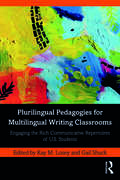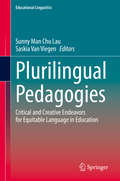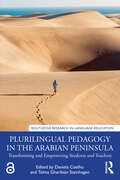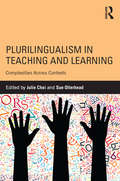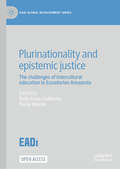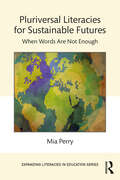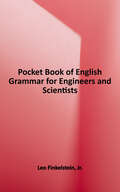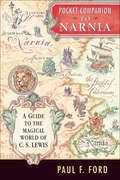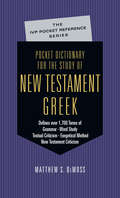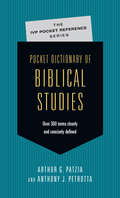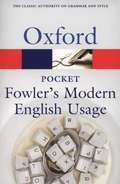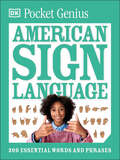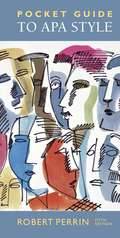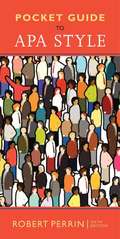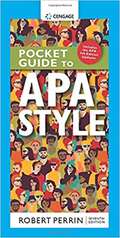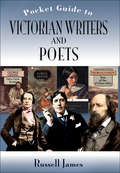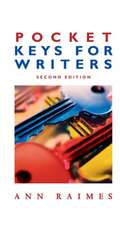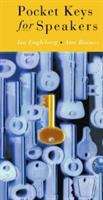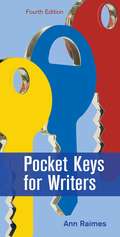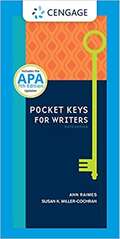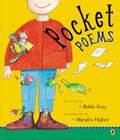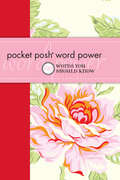- Table View
- List View
Plurilingual Pedagogies for Multilingual Writing Classrooms: Engaging the Rich Communicative Repertoires of U.S. Students
by Kay M. Losey Gail ShuckA much-needed resource on plurilingual pedagogies, this book counters the common dominant English-only approach found in writing and composition classrooms by identifying practices and pedagogies that support multilingual students. Providing a window into a range of contexts and classrooms where students’ full identities are honored, contributors offer research-grounded strategies and pedagogies that allow students to harness all of their language resources in order to build on their strengths and develop their writing abilities. The specific examples in this book, drawn from high school and college writing contexts, demonstrate the value of embracing linguistic diversity in writing programs. Presenting a wide range of models and strategies from top scholars that center students’ linguistic repertoires as strengths, the volume addresses classroom teaching, assessment, curriculum, school administration, and more, all from an asset-based orientation. This book is ideal for courses in composition and second-language writing pedagogy as well as for students, scholars, and educators in second language writing, language and literacy education, and composition studies.
Plurilingual Pedagogies: Critical and Creative Endeavors for Equitable Language in Education (Educational Linguistics #42)
by Sunny Man Chu Lau Saskia Van ViegenThis book critically engages with theoretical shifts marked by the ‘multilingual turn’ in applied linguistics, and articulates the complexities associated with naming and engaging with the everyday language practices of bi/multilingual communities. It discusses methodological approaches that enable researchers and educators to observe and interact with these communities and to understand their teaching and learning needs. It also highlights pedagogical approaches and instructional strategies involved with learning and teaching language and/or content curriculum to students across various learning and educational contexts. The book addresses recent debates on the multi/plural turn in applied linguistics and articulates the limitations of these debates - particularly the absence of discussion of social power relations and contexts in applying different theoretical lenses. It features empirical research from primarily North American classrooms to highlight how plurilingual pedagogies take shape in unique educational contexts, resisting monolingual approaches to language in education. Furthermore, it includes commentary/response pieces from established scholars in dialogue with recent plurilingual research in the field, to put the work in critical perspective within extant theories and literature.
Plurilingual Pedagogy in the Arabian Peninsula: Transforming and Empowering Students and Teachers (Routledge Research in Language Education)
by Daniela Coelho Telma Gharibian SteinhagenThis edited collection explores plurilingual education in the unique English medium instruction (EMI) context of the Arabian Peninsula. The book argues that integrating a plurilingual pedagogy alongside current EMI in the region could enhance students’ learning and contribute to a language policy that embraces linguistic diversity while fostering regional identity. It brings together the work of experts in Arabic and English language policy and planning, presenting empirical research relating to plurilingual pedagogical practices within the region. The book offers a range of recommendations for educators on how to integrate plurilingual pedagogies in classroom teaching. This becomes more important since many educators in the region are non-Arabic speakers and are teaching students with diverse linguistic backgrounds through English. With a holistic and interdisciplinary approach to the linguistic landscape in the Arabian region, this book will be of great interest to researchers, scholars, and students in the fields of applied linguistics, language education, teacher education, and EMI.
Plurilingualism in Teaching and Learning: Complexities Across Contexts
by Julie Choi Sue OllerheadAssembling a rich and diverse range of research studies on the role of plurilingualism across a wide variety of teaching and learning settings, this book supports teacher reflection and action in practical ways and illustrates how researchers tease out and analyze the complex realities of their educational environments. With a focus on education policies, teaching practices, training, and resourcing, this volume addresses a range of mainstream and specialized contexts and examines the position of learners and teachers as users of plurilingual repertoires. Providing a close look into the possibilities and constraints of plurilingual education, this book helps researchers and educators clarify and strengthen their understandings of the links between language and literacy and offers them new ways to think more rigorously and critically about the language ideologies that shape their own beliefs and approaches in language teaching and learning.
Plurinationality and epistemic justice: The challenges of intercultural education in Ecuadorian Amazonia (EADI Global Development Series)
by Ruth Arias-Gutiérrez Paola MinoiaThis book examines interculturality in education in Ecuador at the crossroads between an educational model inherited from the colonial past, which still represents white and mestizo hegemony, and a vision of an alternative form of decolonizing education that contributes to the development of an intercultural and plurinational state, as promised in the Ecuadorian Constitution. Championing indigenous voices and discussing the role of education in the fight against poverty and in the recovery of cultural and ecological diversity, the authors propose that quality education for all, a target of the Sustainable Development Goals, should move out of the commonly defined models of technological modernization and cultural globalization that disvalue knowledge from other cultures. Through their analysis of practical experimentations of indigenous and intercultural education in Amazonian schools and universities, they conclude that enhanced preservation of indigenous languages, cultures and ecological knowledge prove fundamental prerequisites for biological conservation and strengthening societies’ resilience to climate change threats.
Pluriversal Literacies for Sustainable Futures: When Words Are Not Enough (Expanding Literacies in Education)
by Mia PerryThis book presents a new vision of literacy that frames meaning-making and communication in relation to individual, collective, and ecological needs. Building on the concept of the pluriversal, Perry explores how literacy education can support multiple ways of being and becoming. In so doing, Perry rejects limiting and skills-focused definitions of literacy and instead embraces a more profound conceptualisation that reflects the boundless potential of literacy practices. Bringing together research from the Global North and South, Perry connects literacy education with semiotics, philosophy, sustainability studies, and geopolitics to argue for the urgency of a pluriversal model of literacy that combats a normative, neo-colonial understanding of reading and writing. Offering a unique contribution to the field of literacy studies, this book demonstrates how literacy is a semiotic process and literacy practices can connect learner needs with pathways to social, ecological, and cultural sustainability. With Perry as a guide, this illuminating book invites readers to join the journey into literacies beyond words, to arrive at a more holistic and inclusive understanding of what literacy practices are and can be.
Plutarch How to Study Poetry
by Richard Hunter Donald RussellPlutarch's essay 'How to Study Poetry' offers a set of reading practices intended to remove the potential damage that poetry can do to the moral health of young readers. It opens a window on to a world of ancient education and scholarship which can seem rather alien to those brought up in the highly sophisticated world of modern literary theory and criticism. The full Introduction and Commentary, by two of the world's leading scholars in the field, trace the origins and intellectual affiliations of Plutarch's method and fully illustrate the background to each of his examples. As such this book may serve as an introduction to the whole subject of ancient reading practices and literary criticism. The Commentary also pays particular attention to grammar, syntax and style, and sets this essay within the context of Plutarch's thought and writing more generally.
Plutarch’s Politics
by Hugh LiebertPlutarch's Lives were once treasured. Today they are studied by classicists, known vaguely, if at all, by the educated public, and are virtually unknown to students of ancient political thought. The central claim of this book is that Plutarch shows how the political form of the city can satisfy an individual's desire for honor, even under the horizon of empire. Plutarch's argument turns on the difference between Sparta and Rome. Both cities stimulated their citizens' desire for honor, but Sparta remained a city by linking honor to what could be seen first-hand, whereas Rome became an empire by liberating honor from the shackles of the visible. Even under the rule of a distant power, however, allegiances and political actions tied to the visible world of the city remained. By resurrecting statesmen who thrived in autonomous cities, Plutarch hoped to rekindle some sense of the city's enduring appeal. "
Pocket Book of English Grammar for Engineers and Scientists
by Leo FinkelsteinThis user-friendly guide to understanding and properly using English grammar is designed to augment the ability of busy engineering and science students to convey information in a precise manner. The book's sensible organization around the eight parts of speech, its accessible format, and the straightforward explanations of written American English also make it a highly suitable tool for ESL students. While the author's intent is not to emphasize or overload readers with scientific jargon, he does include a rich collection of examples and illustrations that relate directly to engineering and science topics. Clear models and explanations, keyed to diagrams, tables, and flow charts, provide very effective visual elements.
Pocket Companion to Narnia: A Guide to the Magical World of C.S. Lewis
by Paul F. FordThe pocket guide is an adventurer's passport to the land of Narnia. From Aslan, the great lion, to Zardeenah, the mysterious lady of the night, this comprehensive and accessible companion contains hundreds of alphabetically arranged entries covering all the characters, events, places, and themes that Lewis magically wove into his timeless and magical world. This little book will be perfect for the millions of kids and parents who already love the Narnia books and want to go deeper into that world, as well as for those newly drawn to the story by the Narnia movie. The Pocket Companion is a perfect gift book, a natural movie tie-in, and will continue to help readers and fans get closer to the magical world of Narnia for years to come.
Pocket Dictionary for the Study of New Testament Greek (The IVP Pocket Reference Series)
by Matthew S. DeMossIf you are beginning your study of New Testament Greek or Greek exegesis, this book is for you! From ablative to zeugma, it defines the tangled terms that infest Greek textbooks, grammars and lexicons. Here is the book to deliver you from late-night ponderings of the predicate and frantic fumings over the fricative. It is the indispensable lexicon to that third language that is neither Greek nor recognizable English: the technical vocabulary of grammarians, lexicographers, linguists and Greek instructors. What's more, this pocket dictionary gives you the inside edge on the terminology of exegesis, textual criticism and biblical criticism. Careful definitions, helpful examples and copious cross-references make this economically priced, brief dictionary easy to use. And its convenient size will make it a constant companion in your study of the Greek New Testament.
Pocket Dictionary of Biblical Studies: Over 300 Terms Clearly Concisely Defined (The IVP Pocket Reference Series)
by Arthur G. Patzia Anthony J. PetrottaPocket Dictionary of Biblical Studiesgenre criticismtradition criticismagraphavaticinium ex eventuFrühkatholizismusWissenschaftAleppo CodexZadokite Documentacrosticwoe oracleAugustinian hypothesisYahwist sourcecodexWestern textPocket Dictionary of Biblical Studies
Pocket Fowler's Modern English Usage (2nd edition)
by Robert AllenThis invaluable reference work offers the best advice on English usage, drawing on the unrivaled resources of Oxford's English Dictionaries program and language monitoring. This second edition of the "Pocket Fowler" harks back to the original 1926 edition of A Dictionary of Modern English Usage by Henry Fowler, widely regarded as the finest such guide in print. Updated with the use of the Oxford English Corpus, a database of over two billion words, and with up-to-date entries on the language of emails and the Internet, the new edition answers your most frequently asked questions about language use. Should you use a split infinitive or a preposition at the end of a sentence? Is it "infer" or "imply"? "Who" or "whom"? What are the main differences between British and American English? Over 4,000 entries offer clear recommendations on issues of grammar, pronunciation, spelling, confusable words, and written style. Real examples are drawn from classic and contemporary literary sources, newspapers and magazines, and the Internet. Pocket Fowler's Modern English Usage, Second Edition is an indispensable companion for anyone who wants to use the English language effectively.
Pocket Genius American Sign Language: 200 Essential Words and Phrases (Pocket Genius)
by DKStart learning American Sign Language (ASL) with this guide to the most essential everyday ASL phrases and words.If you are a parent looking for an accessible guide to ASL basics for your hearing child, then look no further than Pocket Genius American Sign Language.Perfect for our young readers aged 8-12, this guide combines clear, step-by-step illustrations with simple, to-the-point instructions for signing words, phrases, and sentences in ASL.This compact ASL guide for children offers: A pocket-sized but detailed guide, fitting all the important information into one small package.Easy-to-follow chapters and information suitable for children aged 8+ supported by simple illustrations, instructions, and top tips to learn ASL.Clear step-by-step illustrations make it easy to practice and master each sign.This Pocket Genius series is perfect for all hearing children, whether they are young readers just beginning to explore ASL or little geniuses who are experts already!The illustrations also capture the nuances of each sign–from hand movements to body language and facial expressions–to help your child master the language basics quickly and easily. The pocket size of this book lets them carry it wherever they are–at home, in school, or on the playground.
Pocket Guide To APA Style
by Robert PerrinThe POCKET GUIDE TO APA STYLE, 5E is an essential tool for writing research papers across the disciplines. Concise and thorough, the POCKET GUIDE offers straightforward explanations, annotated examples, and margin notes designed to help writers produce properly documented papers in the latest APA style. Not only less expensive and easier to use than the APA Manual, the POCKET GUIDE also includes extensive coverage of electronic sources, preparing writers to evaluate and use Internet references correctly in their research.
Pocket Guide to APA Style
by Robert PerrinThis Guide is your essential tool for writing research papers in every course you take. Concise and thorough, the Guide offers straightforward explanations, annotated examples, and margin notes designed to help you write properly documented papers in the latest APA style. This practical resource is less expensive and easier to use than the APA Manual. It also includes extensive and up-to-date coverage of electronic sources, preparing you to evaluate and use Internet references correctly in your research.
Pocket Guide to APA Style
by Robert PerrinPerrin's POCKET GUIDE TO APA STYLE, 7th Edition, is your essential tool for writing research papers in every course you take. Concise yet thorough, the POCKET GUIDE presents straightforward explanations, annotated examples and margin notes that help you write properly documented papers in the latest APA style. Student-friendly organization, quick-reference indexing and a convenient spiral design make it easier to use than the APA Manual. Expansive, up-to-date coverage of electronic sources prepares you to evaluate and use internet references correctly in your research, while new guidelines help you appropriately incorporate footnotes. An appendix on annotated bibliographies provides guidance plus plenty of examples. Also available: MindTap English.
Pocket Guide to Victorian Writers and Poets (The\pocket Guide Ser.)
by Russell JamesA fact-filled reference for discovering, and learning more about, the literary greats of the nineteenth century. The Victorian era produced many famous writers and poets, including Dickens, Thackeray, H.G. Wells, and Tennyson. Magazines like The Strand launched famous creations such as Conan Doyle&’s Sherlock Holmes, whose cliffhanger stories were told in part-works to add to the excitement. And the poetry was epic—Tennyson&’s Morte d&’Arthur and The Lady of Shalott tapped into the Pre-Raphaelite style so popular in the art of the day. In this guide, Russell James has explored the role of the Victorian writer and their genres, from Dickens&’s desire to correct social wrongs and expose poverty to H.G. Wells&’s desire to escape the modern world. The responsibility of the Victorian poet is also revealed from romantic declaration and escapism to heroism and historical commemorations—would modern generations know about the Charge of the Light Brigade if Tennyson hadn&’t immortalized it? Together with A–Zs of writers and poets, this is a must-read book for everyone who loves good writing and wants to discover more.
Pocket Keys For Writers 2nd Edition
by Ann RaimesPocket Keys for Writers is a handy reference tool that provides big writing help in a small package. Written by a recognized leader in ESL instruction, Pocket Keys is an excellent resource for ESL writers, with a strong ESL section and ESL notes throughout the text.
Pocket Keys for Speakers
by Ann Raimes Isa EnglebergCombining the expertise of two successful Houghton Mifflin authors, this new handbook for speakers offers students a practical, "how-to" approach to speaking throughout their academic and professional careers. This resource offers students clear and accessible information on organizing, developing, and presenting a speech across the disciplines, along with quick references on grammar and mechanics. In addition, the authors clearly distinguish the principles of oral and written communication. The text s convenient handbook size and format, along with its indispensable, timeless content, make Pocket Keys for Speakers an ideal lifelong resource. Public speaking coverage addresses ethics, listening, communication apprehension, and strategies for speaking in a variety of contexts. Grammar sections cover clarity and written style, sentence basics, punctuation, mechanics, and multilingual/ESL strategies.
Pocket Keys for Writers (4th edition)
by Ann RaimesThis book covers the essentials of the writing process with increased focus on academic writing and new sections on multi-modal composition.
Pocket Keys for Writers (Second Edition)
by Ann RaimesPocket Keys for Writers, 2/e, is a handy reference tool that provides big writing help in a small package. This indispensable pocket-style handbook covers the essentials of the writing process, as well as research, documentation, evaluating print and electronic sources, punctuation, and mechanics. Written by a recognized leader in ESL instruction, Pocket Keys is an excellent resource for ESL writers, with a strong ESL section and ESL notes throughout the text. In short, the text delivers concise, up-to-date, and practical information in a highly accessible, reasonably priced format. The Second Edition of Pocket Keys retains the hallmark Keys organization and use of color, as well as Key Points boxes and the popular Five C's of Style. Also in this edition, material on using visuals in written projects helps students enhance the impact of their documents. Coverage of research and documentation includes using online databases and evaluating web sites.
Pocket Keys for Writers With APA Updates
by Ann Raimes Susan K. Miller-CochranGet big writing help in a small package with POCKET KEYS FOR WRITERS. Based on the authors' research and experience in the college writing classroom, this book offers everything you need to improve your writing. <p><p> The sixth edition features three new extended examples to help you build important critical thinking skills that will serve you well in your college writing and beyond. From navigating the research process to understanding the mechanics of writing and using punctuation to finding and documenting print and electronic source materials, POCKET KEYS FOR WRITERS assembles concise and practical information in one clear, easy-to-use handbook that you'll find yourself turning to again and again.
Pocket Poems
by Bobbi KatzThis lively collection is packed with kid-friendly, "pocket-sized" poems of eight lines or less by such well-known poets as Eve Merriam, Karla Kuskin, and the anthologist herself, Bobbi Katz. The easy-to-memorize, pint-sized poems reflect many different facets of children's lives and are embellished with witty, winning art by the beloved Marylin Hafner, making a package that will be welcomed by children and their teachers.
Pocket Posh Word Power: 120 Words You Should Know
by WordnikWords such as propinquity, armillary, and farrago should be vocabulary staples. Consult Pocket Posh Word Power: 120 Words You Should Know to determine other additions to your lexicon.This Pocket Posh Word Power collection promises a gargantuan vocabulary boost inside an effortlessly portable, ergonomic package that features fun cover embellishments, an elastic band closure, and a convenient lay-flat binding. In addition, each entry provides pronunciation, part of speech, definition, usage in a sentence, and etymology information.
